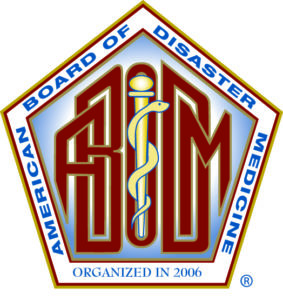What Is the ABODM?
 When a disaster strikes a community, it’s vital that physicians are trained and ready to provide efficient medical care to those affected and to be prepared to offer continuing care during recovery efforts. Unfortunately, this is a significant challenge because every disaster, whether natural or manmade, is unique. That’s why it’s often said disaster medicine really should be every physician’s second specialty and every hospital should have at least one physician who is certified in disaster medicine.
When a disaster strikes a community, it’s vital that physicians are trained and ready to provide efficient medical care to those affected and to be prepared to offer continuing care during recovery efforts. Unfortunately, this is a significant challenge because every disaster, whether natural or manmade, is unique. That’s why it’s often said disaster medicine really should be every physician’s second specialty and every hospital should have at least one physician who is certified in disaster medicine.
In North America, there is only one multi-specialty certification board that certifies physicians in disaster medicine—the American Board of Physician Specialties® (ABPS). The ABPS offers qualified and experienced physicians disaster medicine certification through its Member Board, the American Board of Disaster Medicine® (ABODM®).
The ABODM helps physicians prepare themselves in the event of hurricanes, wildfires, pandemic outbreaks, terror attacks, and more by educating them about the importance of disaster medicine preparedness in the healthcare community. When a major disaster occurs, physicians from all specialties are called into action, and everyone affected—from victims to emergency responders—will depend on physicians to treat injuries, coordinate relief, and help lay the groundwork for recovery.
As disaster medicine specialist and past chairman of the ABODM, Martin E. Thornton, DO, said: “Physicians trained in disaster medicine are needed to provide medical expertise and to work in tandem with other stakeholders to create public health policies that improve both the effectiveness and availability of medical care during disasters.”
Disaster medicine certification from the ABODM communicates to federal, state, and local government officials that certified physicians are qualified to contribute to relief and recovery after a disaster. To that end, ABODM certification focuses on the knowledge and skills a physician needs to become a recognized leader in the four stages of disaster preparation and management: planning, coordination, execution, and debriefing. Physicians certified by the ABODM:
- Have a basic knowledge of the National Incident Management System and the Incident Command System
- Understand the principles of triage in a disaster setting
- Know the importance of protective equipment, decontamination, and site security during a disaster
- Possess the clinical expertise to provide effective care with extremely limited resources
- Understand the concept of psychological first aid and caring for responders
To become certified in disaster medicine, physicians must first satisfy the eligibility requirements of the ABPS, which includes holding a current, unexpired board certification granted by the ABMS, AOA, ABPS, or the Royal College of Physicians and Surgeons. Candidates must then pass a rigorous computer-based exam that consists of 200 multiple-choice questions.
If you are a licensed physician considering become certified in disaster medicine, contact the ABPS today for more information.






